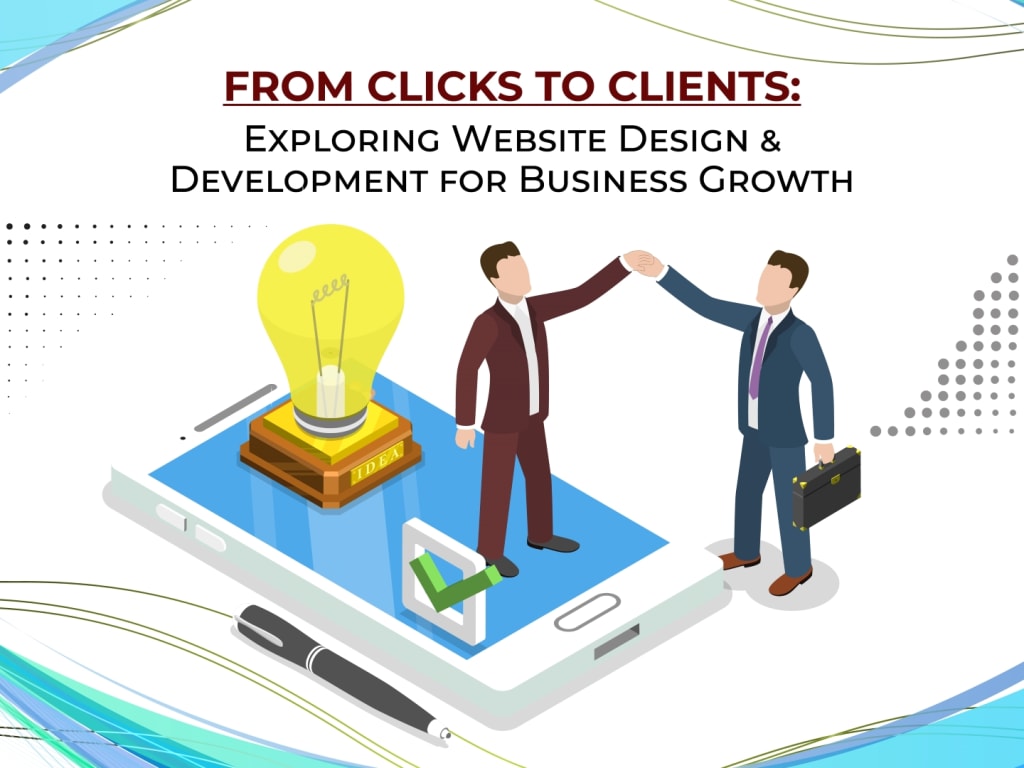Designing for Success: Strategies for Client Conversion Online
From Clicks to Customers: Optimizing Web Design for Growth

In today’s digital age, having a strong online presence is key for businesses to thrive. Websites serve as the cornerstone of this presence, playing important roles in branding, customer engagement, and revenue generation. This guide explores the importance of website design & development in driving business success. From establishing brand identity to fostering customer relationships and exploring diverse revenue streams, we’ll explore how businesses can leverage their websites effectively. With practical insights and strategies, businesses can maximize the potential of their online presence and stay ahead in the competitive digital aspect.
Importance Of Website Development & Design.
Global Reach:
One of the most significant advantages of website design & development is reaching an international audience. Unlike a physical store or office, which is limited by geographical constraints, your website is accessible to anyone with an internet connection, anywhere in the world. This global reach opens up a vast pool of potential customers, allowing you to expand your market beyond local boundaries and tap into new revenue streams.
Reach International Audience
24/7 Accessibility
A website never sleeps. It’s open for business 24 hours a day, 7 days a week, 365 days a year. This means that customers can visit your website and make purchases at any time, even outside of regular business hours. By providing round-the-clock accessibility, you can cater to the needs of busy consumers who prefer to shop online at their convenience, thereby increasing sales and revenue opportunities.
Marketing and Branding
Website development serves as a centralized hub for your marketing efforts, allowing you to showcase your products or services, share testimonials, and communicate your brand’s story effectively. Through search engine optimization (SEO), social media integration, and content marketing strategies, your website can attract organic traffic and generate leads, thereby fueling business growth.
Brand Visibility and Awareness
Your website serves as the digital face of your brand. It’s often the first point of contact for potential customers searching for products or services online. A well-designed website with compelling content, eye-catching visuals, and intuitive navigation not only attracts visitors but also leaves a lasting impression. By consistently reinforcing your brand identity and messaging across your website, you increase brand visibility and awareness, making your business more recognizable and memorable to your target audience.
Lead Generation and Conversion
Website development is a powerful tool for generating leads and converting them into customers. Through strategic calls-to-action, landing pages, and lead capture forms, you can encourage visitors to take specific actions, such as signing up for newsletters, downloading resources, or making purchases. By nurturing these leads through targeted marketing campaigns and personalized communication, you can guide them through the sales funnel and ultimately convert them into paying customers.
Content Marketing and SEO
High-quality content is the cornerstone of any successful website. By regularly publishing relevant and valuable content, such as blog posts, articles, videos, and infographics, you not only engage your audience but also improve your website’s search engine visibility. Search engine optimization (SEO) techniques, such as keyword optimization, meta tags, and link building, help improve your website’s ranking in search engine results pages (SERPs), making it easier for potential customers to find you online. This increased visibility drives organic traffic to your website, resulting in more leads and sales over time.
Customer Engagement and Loyalty
Website development is a powerful platform for engaging with your audience and building long-term relationships with customers. Interactive features such as live chat, forums, and social media integration allow you to connect with visitors in real time, address their queries, and gather feedback. By providing valuable resources, educational content, and personalized recommendations, you demonstrate your commitment to customer satisfaction and foster loyalty toward your brand.
Data Analytics and Insights
Websites provide valuable data and insights into visitor behavior, preferences, and demographics through analytics tools. By analyzing metrics such as website traffic, conversion rates, bounce rates, and user engagement, you gain valuable insights into the effectiveness of your marketing efforts and the performance of your website. This data-driven approach enables you to identify areas for improvement, optimize your marketing strategies, and make informed decisions to drive business growth.
Scalability and Adaptability
As your business grows and evolves, your website can adapt to accommodate changes and expansions seamlessly. Whether you’re adding new products, launching promotional campaigns, or targeting different market segments, your website can be easily updated and customized to reflect your evolving business objectives. This scalability ensures that your online presence remains aligned with your overarching growth strategy.
Adaptation to Mobile Devices
With the increasing prevalence of smartphones and tablets, having a mobile-responsive website is crucial for reaching mobile users and providing them with a seamless browsing experience. Mobile optimization not only improves user satisfaction but also boosts your search engine rankings, as search engines prioritize mobile-friendly websites in their results pages.
Types Of Website
Static website: Static websites have fixed content and layout that doesn’t change for users. They’re built with basic HTML, CSS, and sometimes JavaScript. These sites are simple, fast, and secure because they don’t use server-side processing or databases. This makes them cost-effective to host. Static websites are ideal for small businesses, portfolios, and informational pages that don’t need frequent updates or interactive features.
Dynamic website: Dynamic websites generate real-time content, changing based on user interactions or other factors. These sites use server-side scripting languages like PHP, ASP.NET, or Python to pull data from databases and display it. Dynamic websites are interactive and can provide personalized user experiences.
Responsive website: This ensures that web pages adapt and display properly on various devices and screen sizes, such as desktops, laptops, tablets, and smartphones. It uses techniques like fluid grids, flexible images, and media queries to dynamically adjust the layout and content. Responsive design improves user experience by providing optimal viewing and interaction, regardless of the device being used.
E-Commerce website: E-commerce website design is all about creating online stores where businesses sell stuff. These sites have things like product listings, shopping carts, and secure payment options. They’re designed to make it easy for customers to find and buy what they want. Think of it like a digital version of a store where you can shop from your phone or computer.
Single Page Website: Single-page website design means all the content fits on a single web page. Instead of clicking on different pages, you scroll down to see everything. These sites are great for simple purposes like portfolios or event pages. They’re easy to navigate and work well on mobile devices.
Conclusion
In today’s digital age, a well-designed website is essential for business growth. It expands your reach globally, making your business accessible to potential customers around the clock. A professional-looking website builds credibility, instills trust, and enhances your brand’s reputation.
Website development serves as a central hub for marketing efforts, customer engagement, and relationship building. Websites provide valuable data insights, allowing you to make informed decisions and optimize your strategies. With e-commerce capabilities, targeted marketing, and cost-effective operations, a website offers numerous advantages that traditional business models can’t match.
Moreover, websites offer scalability, adaptability, and the ability to gather customer feedback for continuous improvement. They establish your brand as an authority in your industry, attract organic traffic, and ensure accessibility for all users. Optimizing for mobile devices further extends your reach and enhances user satisfaction.
In essence, investing in a robust website is crucial for any business aiming to thrive in the competitive digital landscape. Use your website as a powerful tool for long-term success, beyond simply staying competitive.
Visit for more: https://alpesamedia.com/knowledge-center/
About the Creator
Enjoyed the story? Support the Creator.
Subscribe for free to receive all their stories in your feed. You could also pledge your support or give them a one-off tip, letting them know you appreciate their work.





Comments
There are no comments for this story
Be the first to respond and start the conversation.